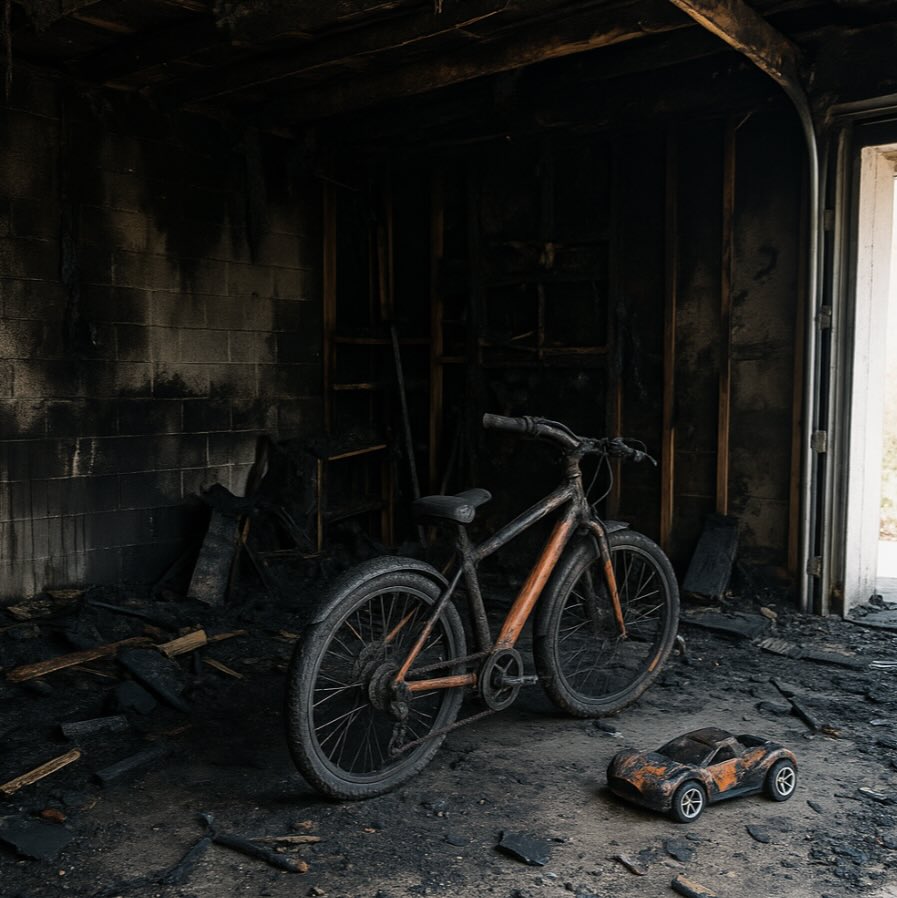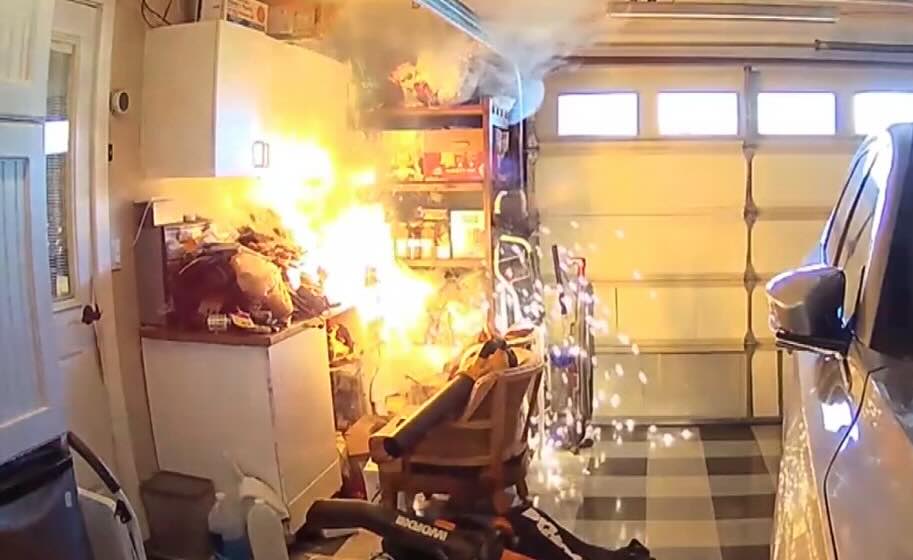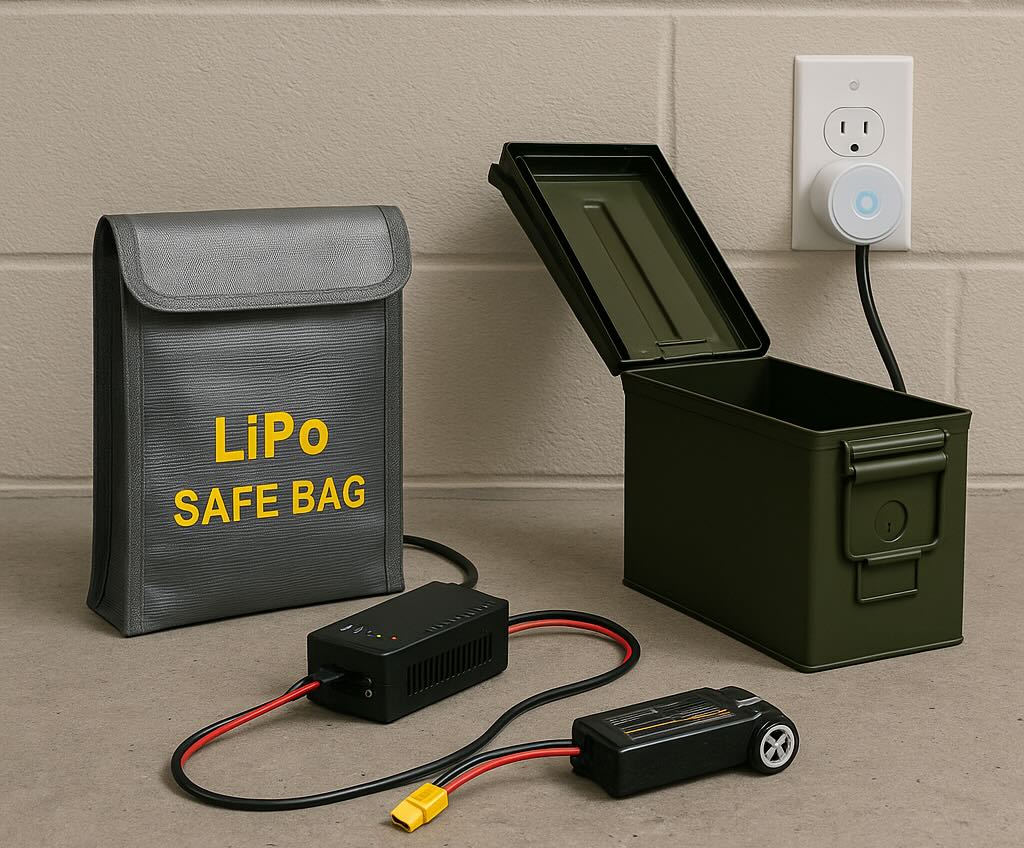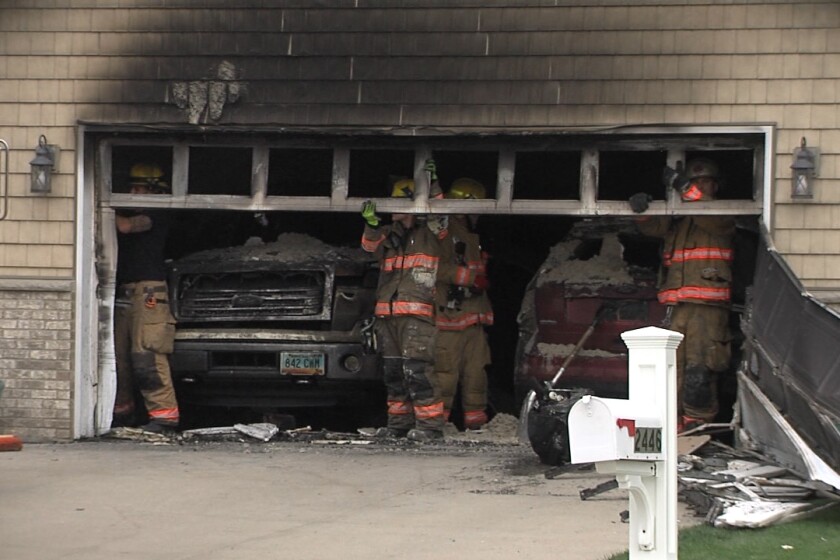Lithium battery fires aren’t just a fluke anymore. They’re happening everywhere, especially in garages packed with electric bikes, RC cars, drones, go-karts, and scooters.
Just ask the New York City Fire Department, which reported 267 lithium battery fires in 2023, resulting in 18 deaths and hundreds of injuries.
Some experts now say we’re sitting on the next asbestos, or at least the next trampoline, when it comes to insurance risk. And the consequences for your homeowners policy could be serious.
If a lithium battery ignites in your home or garage, your insurance provider may treat it as preventable. In fact, adjusters are already asking homeowners whether they charge or store battery-powered devices indoors.

If that battery wasn’t certified or was left charging unattended, you could be on the hook, even for a total loss.
What Insurers Are Doing Already
The insurance industry is quietly reclassifying lithium-ion battery risks. While not yet an official exclusion, the signs are clear:
| Insurer Behavior | What It Means |
|---|---|
| Asking about lithium devices during policy quotes | Risk profiling has begun |
| Excluding fires from “non-certified” batteries | You might be uncovered |
| Raising rates for multi-family homes with e-bike storage | Higher baseline risk |
| Requiring separate coverage for “battery storage” | Already happening in NYC condos |
State Farm, Allstate, and Travelers have all issued internal guidance about lithium-ion fires, and reinsurers are modeling more catastrophic loss scenarios driven by battery-related events.
Meanwhile, property managers in San Francisco and Brooklyn are adding lease clauses banning e-bike charging entirely. You can see why in the video below, it’s not hard to see the danger here.
Why This Is a Real Problem for Hobbyists
Whether you’re charging a 4S LiPo for your remote control car or a 48V battery for your kids ride on car, the fire risk is real. But the gear is essential to your lifestyle. Here’s what you’re actually dealing with:
| Device Type | Typical Battery Size | Fire Risk (1-5) | Common Cause |
|---|---|---|---|
| RC cars (LiPo) | 7.4V–14.8V, 2–6S | 4 | Overcharging or puncture |
| E-bikes or scooters | 36V–72V, 500Wh–1000Wh | 5 | Faulty chargers or storage |
| Drones | 3.7V–22.2V, up to 6S | 4 | Mid-flight damage or aging cells |
| Power banks | 5V, ~10,000mAh | 2 | Low-grade imports or heat |
Battery chemistry, capacity, charging environment, and storage habits all affect fire risk. What doesn’t help? The influx of cheap cells online that don’t meet UL 2271 or 2272 certification.
With the amount of cameras inside homes and garages now, we are finally seeing more and more of these caught on video, like the one below.

A recent Consumer Reports investigation found hundreds of listings for counterfeit or non-compliant e-bike batteries being sold in the U.S.
What Happens If a Fire Starts?
If your garage burns down from a charging battery and your insurer investigates, the outcome might depend on:
- Whether the battery was certified (UL-listed or otherwise)
- Whether the device was left charging unattended
- Whether you had fire mitigation tools in place (metal box, charging bag, etc.)
- Whether they classify the event as “negligent use” or “excluded equipment”
In one Reddit thread, a homeowner claimed their claim was reduced by 80% after an adjuster determined the fire started from a third-party electronic scooter battery “not recommended by the manufacturer.” No lawsuit, no appeal—just a policy loophole.
How to Protect Yourself (And Your Home)
If you’re storing or charging lithium batteries at home, you need to act like your insurer is watching. Here’s a starter checklist:
- Use fireproof charging bags or metal ammo cans
- Never charge overnight or unattended
- Only buy UL-listed batteries and smart chargers
- Use a smart outlet or charge timer
- Store batteries in a cool, ventilated space
- Never store batteries on carpet or wood
- Ask your insurer if lithium fires are covered under your contents and structure policy

Some hobbyists are even installing small fire extinguishers near their charging stations or using temperature sensors to shut off charging automatically. It’s not overkill—it’s becoming the new norm.
A Ban Is Not Unthinkable
Just like some insurance companies won’t cover certain dog breeds or trampoline injuries, battery-powered gear could become the next excluded category. Several NYC and San Jose housing authorities have already banned e-bike storage in multi-family units.
California legislators are debating bills requiring all imported batteries meet strict UL standards or be restricted from sale altogether. In five years, charging your RC car in the garage might violate your lease—or void your insurance.
“As your Fire Commissioner, my top priority is to keep the people of New York City safe and our members safe,” NYC Fire Commissioner Robert Tucker said. “We need the public’s help. One life lost is too many.”
Where This Goes Next
This issue sits at the intersection of hobbyist freedom, fire safety, and corporate liability. If insurers won’t adapt to battery tech, it may fall on homeowners to foot the bill—or find new ways to protect their gear and their homes.
Have you been asked about battery storage by your insurer? Do you think that storage of electronic bikes and RC gear will eventually be regulated indoors?
Would love to hear what everyone thinks.

